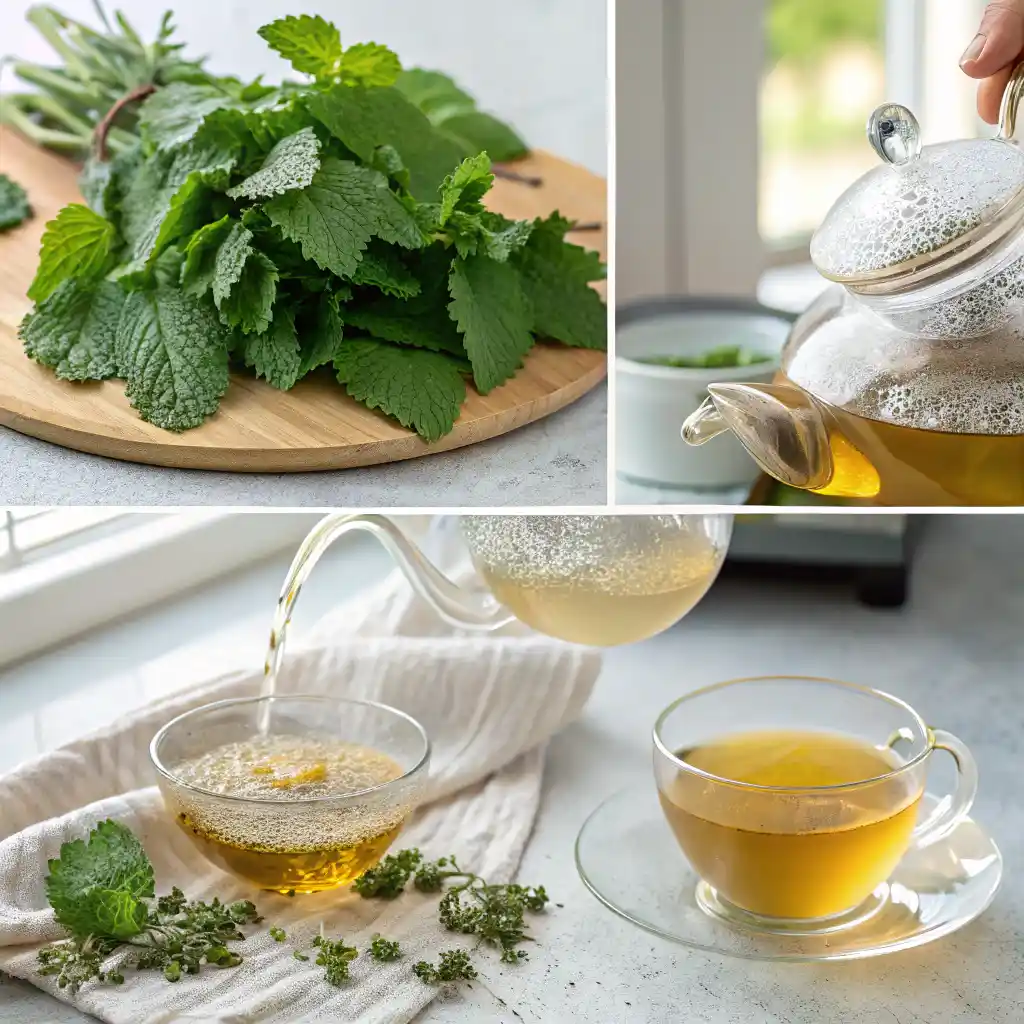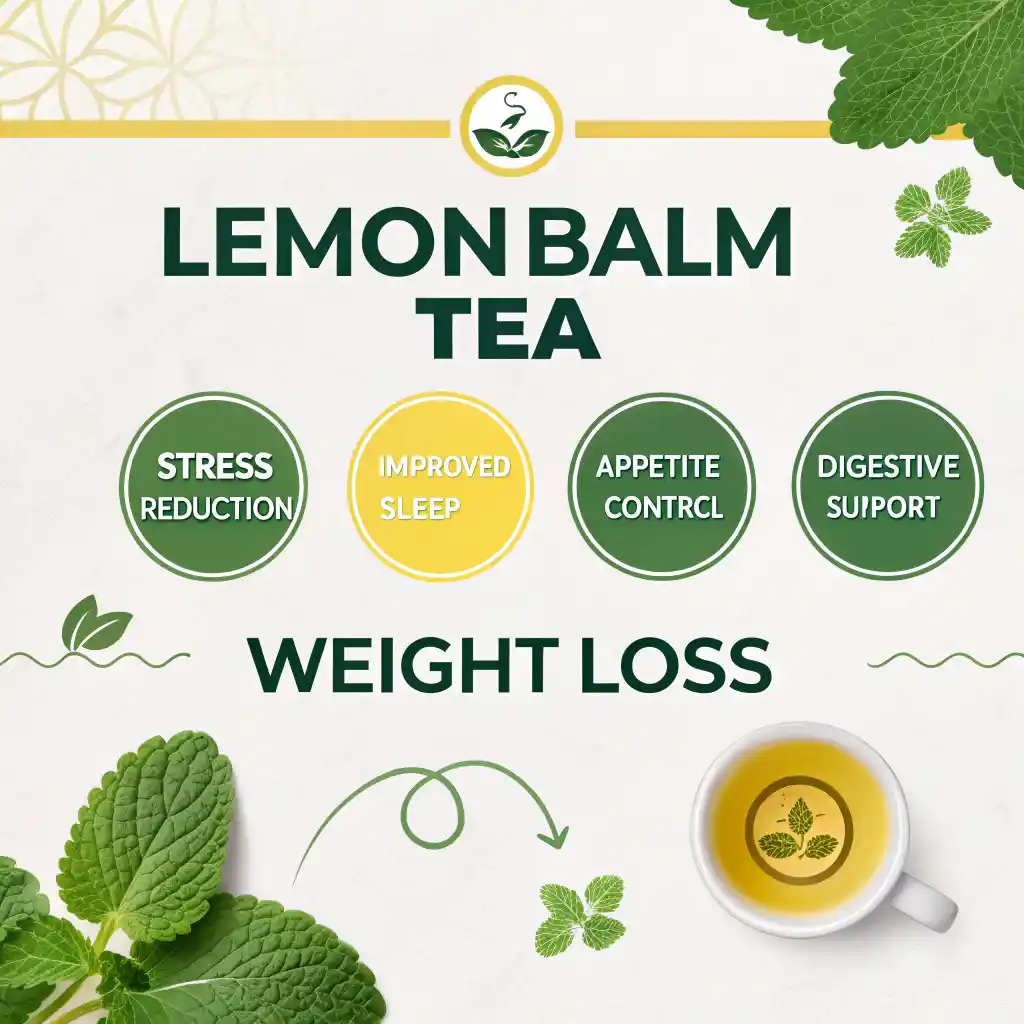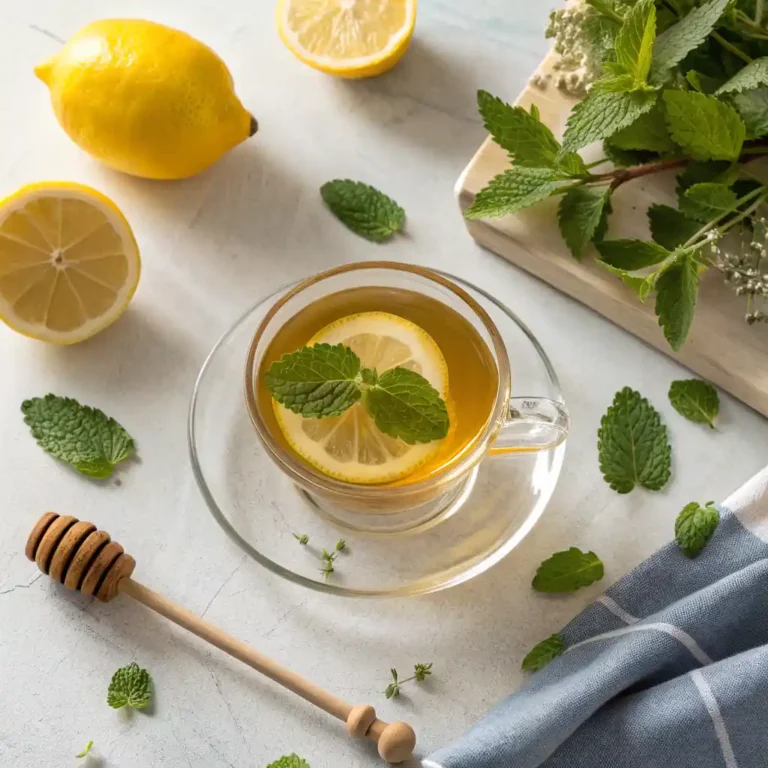Lemon balm tea recipe. Three simple words that completely reshaped my wellness routine.
Hi, I’m Sophy — and I’ll be honest with you. This isn’t just another herbal tea recipe. It’s a daily ritual that shifted how I handle stress, cravings, and even sleep.
Let me take you back for a second. Not long ago, my evenings ended with endless snacking and restless nights. My body felt heavy, my energy low, and no amount of “quick fixes” seemed to work.
Like many of you, I wanted something simple but powerful — something natural that could fit easily into my day. No fad diets. No complicated routines.
That’s when I discovered the quiet magic of lemon balm tea. Fresh leaves, hot water, and patience. That’s it. Yet the results? Calmer nights. Fewer cravings. A lighter, more balanced feeling in my body.
I didn’t invent this lemon balm tea recipe. But I did perfect it in my kitchen — tested, tweaked, and enjoyed until it became a go-to ritual I can’t live without.
I’d like to offer this to you. This guide is everything I wish I had when I first searched “how to make lemon balm tea for weight loss.” No gimmicks. Just a soothing recipe that feels good to drink — and may help you feel more like yourself again.
JUMP TO

Hot Lemon Balm Tea for Weight Loss
Ingredients
Method
- Prepare the leaves: Gently bruise fresh lemon balm leaves by rolling them between your palms to release essential oils.
- Heat water: Bring filtered water to a gentle boil, then let cool for 1-2 minutes to reach 200°F.
- Steep tea: Place lemon balm leaves in your teacup or teapot. Pour hot water over leaves and cover.
- Time steeping: Allow to steep for 5-7 minutes for optimal flavor and therapeutic benefits.
- Strain and serve: Remove leaves, add honey or lemon if desired, and enjoy while warm.
Video
Notes
- Fresh leaves provide superior flavor but dried works well too
- Don’t use boiling water as it can make the tea bitter
- Cover during steeping to retain essential oils
- Best consumed 30 minutes before meals or 1-2 hours before bedtime
- Can be enjoyed 2-3 times daily
What Is Lemon Balm?
Lemon balm (Melissa officinalis), a member of the mint family (Lamiaceae), is a perennial herb. Native to the Mediterranean region and Western Asia, this fragrant herb has been cultivating hearts and gardens for over 2,000 years. The name “Melissa” comes from the Greek word for honeybee, as these industrious insects are particularly attracted to the plant’s sweet, lemony flowers.
You’ll easily recognize lemon balm by its distinctive heart-shaped, serrated leaves that release a delightful citrusy aroma when crushed. The plant can grow up to 2 feet tall and produces small white or pale yellow flowers during summer months. Unlike its mint relatives, lemon balm has a gentler growth pattern and won’t aggressively take over your garden.

Traditional Uses in Herbal Medicine
Throughout history, lemon balm has earned the nickname “the scholar’s herb” due to its reputation for enhancing mental clarity and promoting tranquility. Ancient Greek physicians prescribed it for nervous disorders and melancholy, while medieval monasteries cultivated it in their medicinal gardens to treat everything from insomnia to digestive complaints.
Traditional European herbalism has long valued lemon balm for its ability to “gladden the heart” and ease nervous tension. Paracelsus, the famous 16th-century physician, called it “the elixir of life” and believed it could restore youth and vitality. While we might view such claims with modern skepticism, contemporary research has validated many of lemon balm’s traditional uses.
Key Active Compounds
Lemon balm’s therapeutic properties stem from its rich phytochemical profile. The most notable compounds include:
Rosmarinic Acid: This powerful antioxidant compound gives lemon balm its anti-inflammatory and neuroprotective properties. Research shows rosmarinic acid may help reduce cortisol levels and support healthy stress responses.
Flavonoids: These plant compounds, including luteolin and apigenin, contribute to lemon balm’s calming effects and may support healthy metabolism.
Essential Oils: Compounds like citronellal, geraniol, and linalool provide the characteristic lemony scent and contribute to the herb’s relaxing properties.
Tannins: These astringent compounds support digestive health and may help with appetite regulation.
Benefits of Lemon Balm Tea
Stress and Anxiety Relief
One of lemon balm’s most well-documented benefits is its ability to promote relaxation and reduce anxiety. A study published in the journal Nutrients found that participants who consumed lemon balm extract experienced significant reductions in anxiety levels compared to the placebo group. The herb works by enhancing GABA activity in the brain, the same neurotransmitter targeted by many anti-anxiety medications, but through a much gentler mechanism.
Real-world example: Sarah, a marketing executive from Denver, shared how switching from her afternoon coffee to lemon balm tea helped her manage presentation anxiety. “I used to get jittery before big meetings, but now I sip lemon balm tea 30 minutes beforehand, and I feel centered and confident.”
Digestive Health Support
Lemon balm’s antispasmodic properties make it excellent for digestive comfort. The herb helps relax the smooth muscles of the digestive tract, reducing bloating, gas, and stomach discomfort. Traditional herbalists have long recommended lemon balm tea after heavy meals, and modern research supports this practice.
A clinical study involving 120 participants with functional dyspepsia found that those who consumed lemon balm extract experienced significant improvement in digestive symptoms compared to the control group. The participants reported less bloating, improved appetite regulation, and better overall digestive comfort.
Sleep Quality Improvement
Quality sleep is crucial for weight management, and lemon balm excels in this area. Unlike sleep medications that can leave you groggy, lemon balm promotes natural, restorative sleep by calming the nervous system without causing drowsiness during the day.
Research published in the Mediterranean Journal of Nutrition and Metabolism showed that participants who consumed lemon balm tea before bedtime experienced improved sleep quality scores and reduced nighttime restlessness. Better sleep directly impacts hormones like leptin and ghrelin, which regulate hunger and satiety.
Natural Appetite Control
Lemon balm’s stress-reducing properties indirectly support healthy appetite control. Stress triggers an increase in cortisol, which can heighten the desire for high-calorie comfort foods. By naturally lowering stress responses, lemon balm tea may help reduce stress-induced eating patterns.
Low-Calorie Alternative to Sugary Drinks
With virtually zero calories, lemon balm tea makes an excellent replacement for high-calorie beverages. A single cup of lemon balm tea contains less than 5 calories, compared to 150+ calories in a typical soda or 200+ calories in a flavored coffee drink. This simple swap can create a significant caloric deficit over time.
Lemon Balm Tea Recipe (Hot Version)
Ingredients:
- Use 2 tablespoons of fresh lemon balm leaves, or 1 tablespoon if using dried.
- 1 cup (8 oz) filtered water
- Optional: 1 teaspoon raw honey
- Optional: Fresh lemon slice
Step-by-Step Preparation:
- Prepare the leaves: If you’re using fresh lemon balm, gently roll the leaves between your hands to release their oils. This releases more essential oils and enhances flavor.
- Heat the water: Bring filtered water to a gentle boil, then let it cool for 1-2 minutes to about 200°F. To avoid bitterness and protect delicate compounds, don’t use boiling water.
- Steep the tea: Put the lemon balm leaves in your teacup or teapot. Pour the hot water over the leaves and cover to prevent essential oils from escaping.
- Time it right: Steep for 5-7 minutes for optimal flavor and therapeutic benefits. Longer steeping may result in a bitter taste.
- The final step: Strain the liquid to remove the leaves. You can then mix in honey or lemon to taste and serve it warm.
Tips for Best Flavor:
- Use a covered teapot or cup during steeping to retain essential oils
- Start with less steeping time and adjust to your taste preference
- Fresh leaves provide superior flavor, but dried leaves work well too
- For best results, keep dried lemon balm in sealed containers and store it in a cool, dark place.

Lemon Balm Iced Tea Recipe
Ingredients:
- 4 tablespoons fresh lemon balm leaves (or 2 tablespoons dried)
- 2 cups filtered water
- Ice cubes
- Optional garnishes: lemon slices, fresh mint sprigs, cucumber slices
- Optional sweetener: 1-2 teaspoons honey or stevia
Step-by-Step Preparation:
- Create a concentrated base: Use double the amount of lemon balm leaves to account for dilution from ice.
- Hot brew method: Follow the hot tea recipe above, but use 2 cups of water and steep for 7-8 minutes for a stronger concentration.
- Cool completely: Allow the tea to reach room temperature, then refrigerate for at least 1 hour.
- To serve, add ice to glasses and pour in the tea. Add garnishes as desired.
- Cold brew alternative: For a smoother taste, combine leaves and cold water in a jar. Refrigerate for 6-8 hours, then strain.
Creative Serving Ideas:
- You can create a spa-like feel by infusing the water with fresh mint and cucumber.
- Citrus burst: Include lemon, lime, and orange slices
- Herbal blend: Mix with cold green tea for added antioxidants
- Fizzy version: Top with sparkling water for a healthy soda alternative
How Lemon Balm Tea May Help With Weight Loss
Stress Reduction and Cortisol Balance
Chronic stress is one of the biggest obstacles to successful weight loss. When we’re stressed, our bodies produce excess cortisol, a hormone that promotes fat storage, particularly around the midsection. Cortisol also increases cravings for high-calorie, high-sugar foods.
Lemon balm’s adaptogenic properties help normalize cortisol levels naturally. A study published in Psychosomatic Medicine found that participants who consumed lemon balm extract showed significantly lower cortisol responses to stress compared to the control group. Lemon balm tea can help manage stress, which in turn may prevent weight gain and emotional eating that are often linked to stress.
Real example: Mark, a financial advisor from Chicago, found that drinking lemon balm tea during his stressful workday helped reduce his 3 PM vending machine visits. “I used to reach for candy bars when deadlines hit, but now I sip lemon balm tea instead. I’ve lost 12 pounds in three months just from that change.”
Sleep Quality and Metabolism Connection
Quality sleep is fundamental to healthy metabolism. During deep sleep, our bodies produce growth hormone, repair tissues, and regulate hormones that control hunger and satiety. Poor sleep disrupts these processes, leading to increased appetite, slower metabolism, and weight gain.
Lemon balm promotes restorative sleep by calming the nervous system without causing dependency. Research shows that people who sleep 7-9 hours per night have lower BMIs and better weight management success compared to those who sleep less than 6 hours.
Digestive Support and Bloating Relief
Digestive discomfort and bloating can make you feel heavier and less motivated to maintain healthy habits. Lemon balm’s carminative properties help reduce gas, bloating, and digestive discomfort, making you feel lighter and more comfortable.
The herb’s mild diuretic effect may also help reduce water retention, contributing to a flatter stomach and improved body composition appearance. While this isn’t true fat loss, the confidence boost from feeling less bloated can support long-term weight management efforts.
Gentle Appetite Management
Unlike harsh appetite suppressants, lemon balm supports healthy appetite regulation through stress reduction and improved digestion. When we’re less stressed and sleeping better, our natural hunger and satiety cues function more effectively.
Lemon balm tea can also serve as a healthy ritual that replaces less beneficial habits. Instead of reaching for sugary snacks during afternoon energy dips, a warm cup of lemon balm tea provides comfort and satisfaction without the calories.

Safety and Precautions
Although lemon balm is typically safe for most individuals, some people should take precautions.
Who Should Avoid Lemon Balm:
Pregnant and breastfeeding women: Although lemon balm has a long history of traditional use, there’s insufficient research on its safety during pregnancy and breastfeeding. Consult your healthcare provider before use.
Thyroid conditions: Lemon balm may reduce the production of thyroid hormones. If you have hypothyroidism or take thyroid medications, discuss with your doctor before regular use.
Upcoming surgery: If you have a surgery scheduled, you should stop taking lemon balm at least two weeks beforehand. This is because lemon balm has sedative effects that could interfere with anesthesia.
Medication interactions: If you take sedatives, anti-anxiety medications, or thyroid drugs, consult your healthcare provider before adding lemon balm tea to your routine.
General Safety Guidelines:
- Start with small amounts (1/2 cup) to assess tolerance
- Begin with weaker concentrations and gradually increase strength
- Limit consumption to 2-3 cups per day
- Take breaks from daily use every few weeks
- Choose organic lemon balm when possible to avoid pesticide residues
Frequently Asked Questions
How to Consume Lemon Balm for Weight Loss?
For weight loss support, timing and consistency are key:
Morning routine: Start with 1 cup of lemon balm tea 30 minutes before breakfast to support healthy cortisol rhythms and set a calm tone for the day.
Pre-meal consumption: Drink 1/2 cup 15-20 minutes before lunch and dinner to support digestion and natural appetite regulation.
Evening ritual: Enjoy 1 cup 1-2 hours before bedtime to promote restful sleep and prevent late-night snacking.
Daily intake recommendations: Limit to 2-3 cups daily. More isn’t necessarily better, and excessive consumption may cause drowsiness.
Enhancing combinations: Consider blending with green tea for added metabolism support, or add fresh ginger for digestive benefits and thermogenic properties.
Is Lemon Balm as Effective as Ozempic for Weight Loss?
This comparison highlights an important distinction between herbal support and medical treatment:
Mechanism differences: Ozempic (semaglutide) is a prescription medication that directly affects insulin sensitivity and slows gastric emptying, leading to significant appetite suppression and weight loss. Lemon balm works through gentle stress reduction, sleep improvement, and digestive support.
Effectiveness scale: Clinical studies show Ozempic can lead to 10-15% body weight reduction in many patients. Lemon balm’s weight loss effects are much more modest and indirect, typically supporting 2-5 pounds of loss when combined with healthy lifestyle changes.
Safety profiles: Ozempic carries risks of serious side effects and requires medical supervision. Lemon balm has an excellent safety profile for most people but offers gentler results.
Best approach: Think of lemon balm as a supportive tool in a comprehensive weight management strategy, not a standalone solution. If you need significant weight loss for health reasons, consult with healthcare providers about appropriate medical options while using lemon balm tea as complementary support.
How Do You Make Lemon Balm Tea for Weight Loss at Home?
Here’s a beginner-friendly approach specifically for weight loss support:
Basic weight loss blend:
For your upcoming surgery, you’ll need one tablespoon of dried lemon balm or two tablespoons if it’s fresh.
1 cup hot water (200°F)
1/2 teaspoon fresh grated ginger (optional, for metabolism boost)
Squeeze of fresh lemon juice
Use stevia for sweetness. If weight loss is a goal, it’s best to skip the honey.
Preparation steps:
Combine lemon balm and ginger in a tea infuser or teapot
Pour hot water over herbs and steep for 6-7 minutes
Strain and add lemon juice and stevia if desired
Drink 30 minutes before meals or 2 hours before bedtime
Weekly prep tip: Make a large batch on Sunday by combining 1 cup dried lemon balm with optional herbs in an airtight container. Use 1 tablespoon of this blend per cup throughout the week.
Storage advice: Fresh lemon balm tea is best consumed within 24 hours. Store prepared tea in the refrigerator and reheat gently or enjoy cold.
Final Thoughts
Lemon balm tea offers a gentle, natural approach to supporting your weight loss and wellness journey. While it’s not a magic bullet for dramatic weight loss, this remarkable herb addresses several underlying factors that can sabotage our best efforts – stress, poor sleep, digestive discomfort, and emotional eating patterns.
The beauty of lemon balm lies in its holistic approach. Instead of forcing dramatic changes on your body, it supports your natural processes, helping you feel calmer, sleep better, and make more mindful food choices. Combined with a balanced diet and regular physical activity, lemon balm tea can be a valuable ally in achieving sustainable weight management.
Remember that lemon balm is a supportive herb, not a substitute for medical treatment or professional guidance. If you have significant weight loss goals or underlying health conditions, always consult with qualified healthcare providers to develop a safe, effective plan tailored to your individual needs.
Whether you prefer the warming comfort of hot lemon balm tea on a chilly morning or the refreshing zing of iced lemon balm tea on a summer afternoon, both versions offer the same beneficial compounds and potential for supporting your wellness goals.
Why not start your lemon balm journey today? Try both the hot and iced recipes, experiment with different combinations, and discover how this gentle herb can enhance your daily wellness routine. Give your future self a gift: less stress and more rest.
Ready to experience the calming benefits of lemon balm tea for yourself? Ready for a simple and delicious hot tea? We’ve got a great recipe for you to try. Once you’ve made it, tell us about your experience below. For more natural wellness tips and herbal recipes, subscribe to our newsletter and join our community of health-conscious tea enthusiasts!





